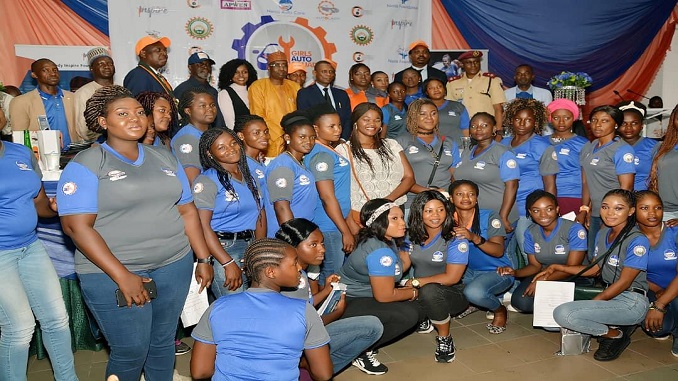By Lillian Okenwa
The call for Nigerian women to get more involved in science and technology was re-emphasised recently in Abuja when Girls Auto Squad (GAS), a Girl-Centred Mechanical Engineering Advocacy Project and Nigerian Institution of Mechanical Engineers (NIMechE) inducted 30 young ladies as automobile mechanics.
Women in Nigeria and other parts of Africa have been most disadvantaged in educational and career opportunities related to the STEM (Science, Technology, Engineering and Math) field. Girls are often encouraged to take courses regarded as easier and more flexible to being a wife and a mother
This year’s International Day of Women and Girls in Science theme: “Invest in Women and Girls in Science for Inclusive Green Growth,” highlights the fact that science and gender are both vital for the achievement of internationally agreed development goals, including the 2030 Agenda for Sustainable Development.
Addressing the inductees who had been trained in Auto Diagnostics Quick Services, Dr. Amina Sambo Magaji, National Coordinator, Office of the ICT Innovation and Entrepreneurship (OIIE) Abuja, a first class degree holder in computer science and a Doctorate in Artificial Intelligence posited that academic success is more about how learning benefits the larger society.

She counselled that more girls should be encouraged at early years to develop interest in technology oriented subjects. This she said could be explored using different approaches including games and stories that would awaken their interest in science and technology.
Magaji at the event organized in collaboration with Nenis Auto Care and AutoLady Synergy Coy Ltd, advocated that women in technical fields should project themselves more and tell their stories to help build other girls’ confidence and careers. Insisting that they should make themselves more visible for people to know what they are doing and what they have done, she told the inductees to take themselves and their work seriously, otherwise, nobody else would.
Earlier, President of the Nigerian Society of Engineers, Engr. Adekunle O. Mokuolu gave an opening charge. “It is what you do, that can create an enviable living standards for you as obtained in the developed countries. We must begin to align head knowledge with competencies and economic development.”
Likewise, Keynote Speaker, Mr. Jelani Aliyu, Director General, National Automotive Design & Development Council (NADDC) Abuja cautioned that the earlier youths are empowered with the requisite knowledge, the earlier we set our society right with young energies creatively employed and engaged. He disclosed that in all his 20 years at GM Motors, nobody ever asked to see his degrees or any certificate for that matter. They were more concerned about what he could do; what he had to offer.
According to Joyce Daser Adams, one of the initiators of GAS, the initiative was conceived as an advocacy and empowerment programme for disadvantaged girls, especially internally displaced persons (IDPs) in Nigeria’s most prominent urban centers, particularly in the Northern areas.
It is a direct response to the myriads of challenges facing young girls in urban centers vis-à-vis absence of educational support, extreme poverty, and social vices. It was the position of the initiator that except positive action is taken at individual, groups and governmental levels, these challenges will never go away. This ideal birthed the initiative.
GAS aside improving the educational status of disadvantaged girls to meet the Sustainable Development Goals (SDGs), primarily targets the change of the living conditions of these girls through automotive education fused with capacity building, entrepreneurship development and start-up funding to create a holistic programme that empower the beneficiaries mentally, socially and economically thus helping them to contribute their own quota to social development.
The programme in its first phase will reach 500 beneficiaries in Lagos and Abuja and see the girls acquiring the rudiments and intricate knowledge of running a mobile maintenance enterprise over the course of one year. They would receive ongoing mentorship and business management assistance to ensure that their enterprises are not only profitable but successful and sustainable.
GAS is positioned as a lifeline for beneficiaries and a chance to change the conversation on women empowerment and opportunity creation in sectors that exhibit high gender disparity, like the automobile sector in Nigeria.
The World Economic Forum’s Global Gender Gap Report shows that Female talent remains one of the most under-utilized business resources, either squandered through lack of progression or untapped from the onset.
The effect of this gap has led to gender inequality, reduction in economic growth, social injustice, lower class value, lack of productive opportunities borne by women, and poor remuneration for women.
Adams said that: “To address this in a meaningful way that shows impact, we seek to implement Girls Auto Squad: A social project determined to empower girls and women with very little resources through an Entrepreneurship, Technical and Vocational Education Training (ETVET) programme in other to make them mobile Auto Diagnostics and Quick Service Technicians.
“Girls Auto Squad (GAS) is targeted as Nigeria’s premier advance technical, vocational, entrepreneurial and life skills learning programme that will create a generation of self-sustained and employable female youths. The programme will provide a viable pipeline of skilled female technicians to establish their own entrepreneurial ventures. By so doing, the employment landscape will become more competitive and creative, thus, reducing the level of unemployed and unemployable females in Nigeria.
“At a time when the Federal Government is focused on the diversification of the economy and industries are requiring specific skills from potential employees, Girls Auto Squad is poised to lead the charge in the provision of access to basic, non-formal/formal skills. Developed by a crop of sterling professionals with a broad spectrum of experience in the Automotive engineering, vocational, human management and entrepreneurship sectors, the programme will unveil a new approach in skills education in Nigeria.
“Why we are doing it? Empowering adolescent girls’ matters to us because, it is her right. Career has no gender. Empowered girls mean healthier families. Empowered girls are key to breaking the cycle of poverty for families around the world. Empowered girls strengthen economies.
“This project includes different activities. These are participant selection, Girls Auto Squad flag off/induction ceremony, training program, setting up of mobile enterprises for the girls, and alumni network engagement and mentorship. Girls Auto Squad is designed for girls that fall under the listed category: Ages 16-30, out of school girls, disadvantaged girls, domestic workers, young mothers, nomadic girls, internally displaced girls.
“Going forward, in our 24 months of operations we will develop an online training platform for our technicians, this will ensure that individuals from across the nation can benefit from the programme without incurring high logistics cost. The only mandatory aspect that requires the trainee to be present will be for certain practical and competency tests.
“The importance of the computer has been widely recognized as a means to improve efficiency in business, government and formal education, but its application in vocational training is not fully appreciated. Rates of learning on computer are four to ten times faster than they are in a classroom setting and learning retention is likely to be much higher. This is true for academic as well as vocational and skill-based subjects.”





коли закінчиться війна в україні 2022 екстрасенси коли почалась друга світова війна скільки ще буде тривати війна в україні
http://bit.ly/legenda-destan-vse-serii
Капитан Филлипс